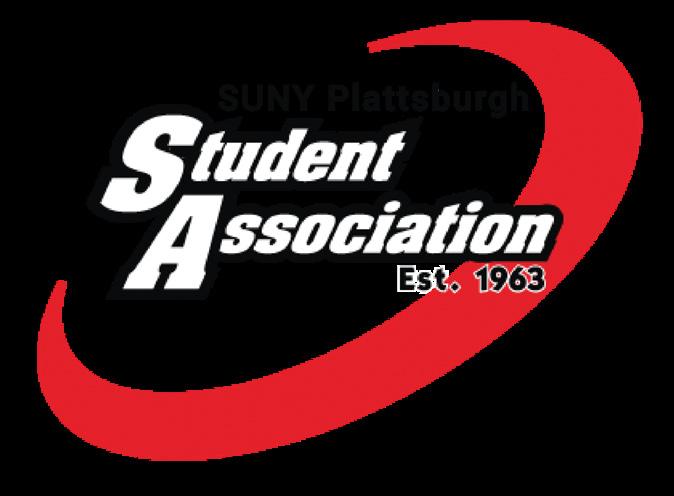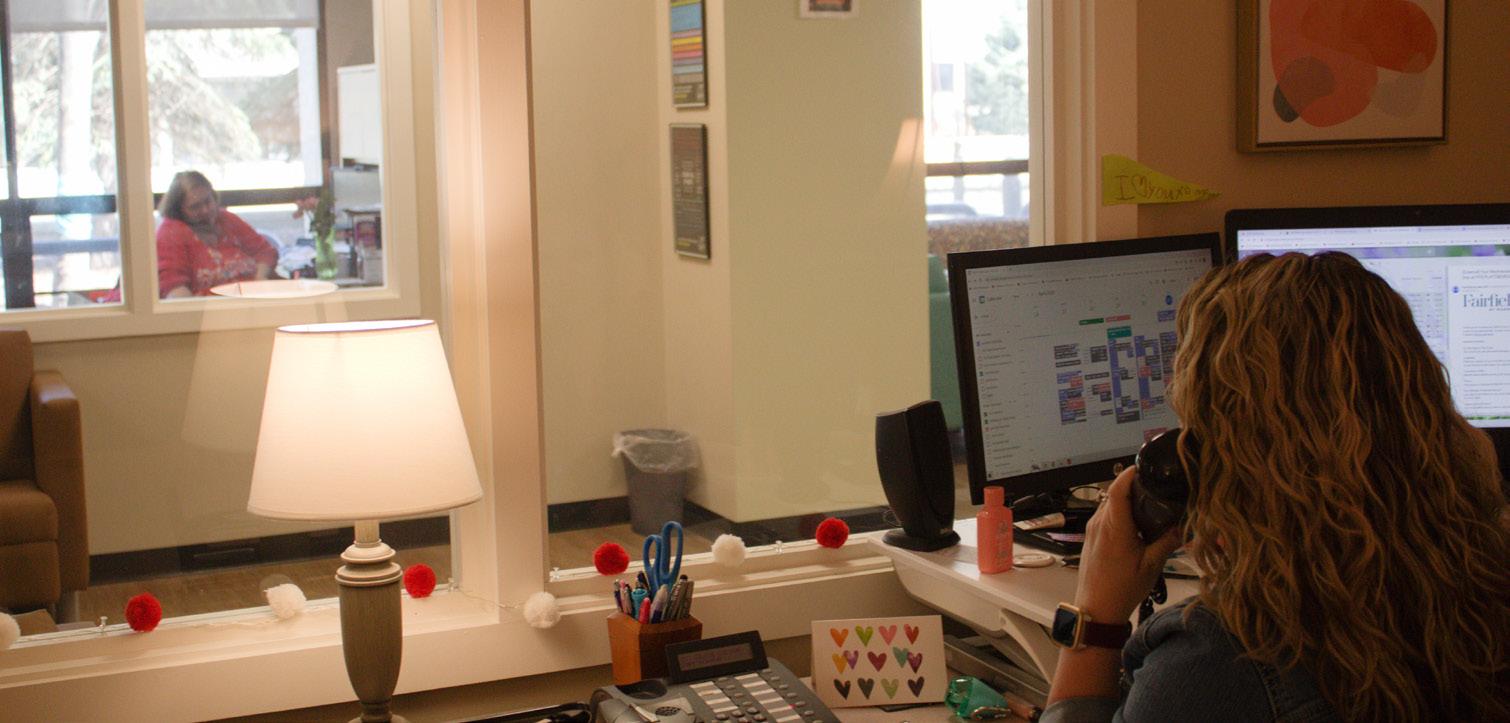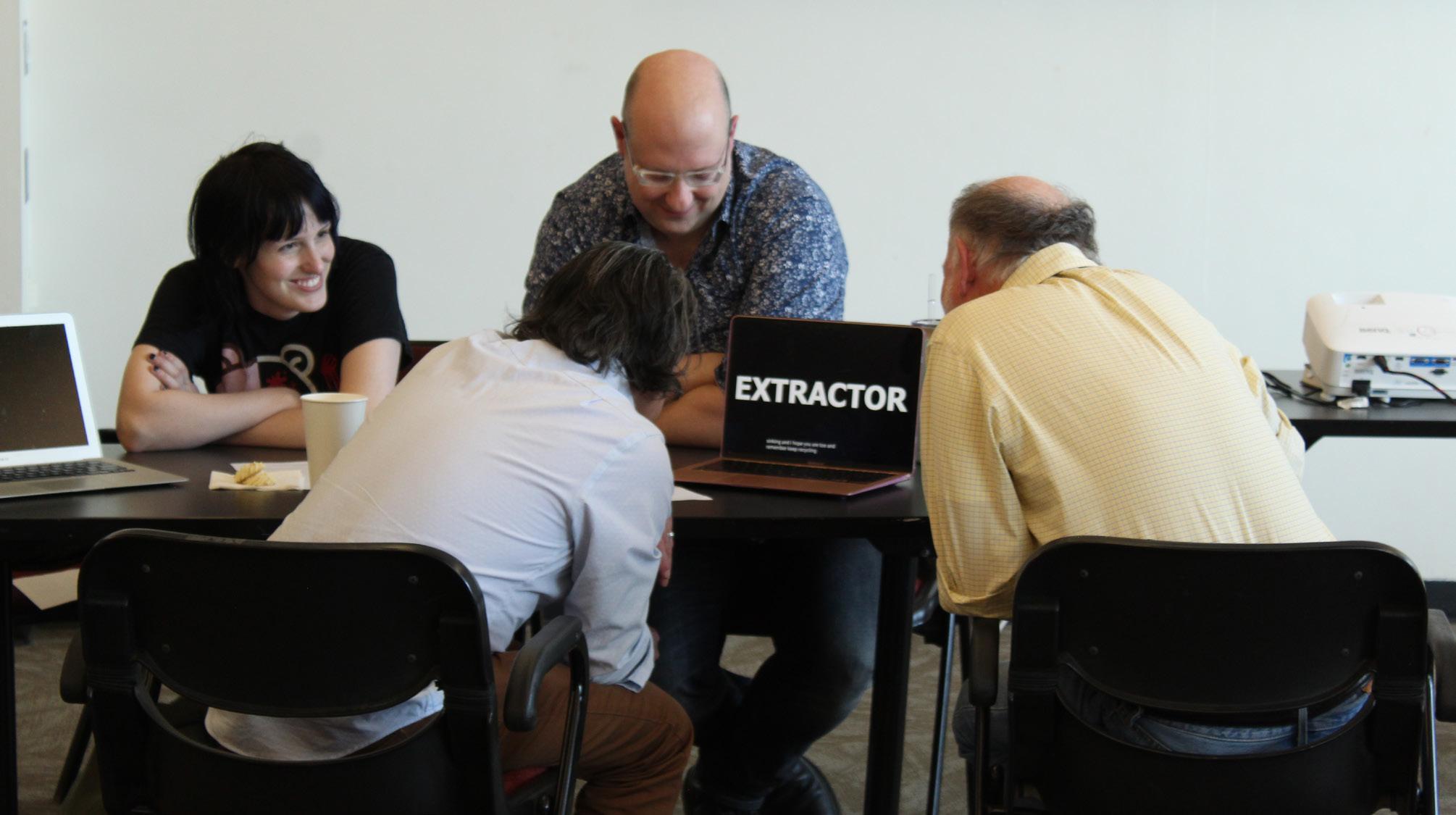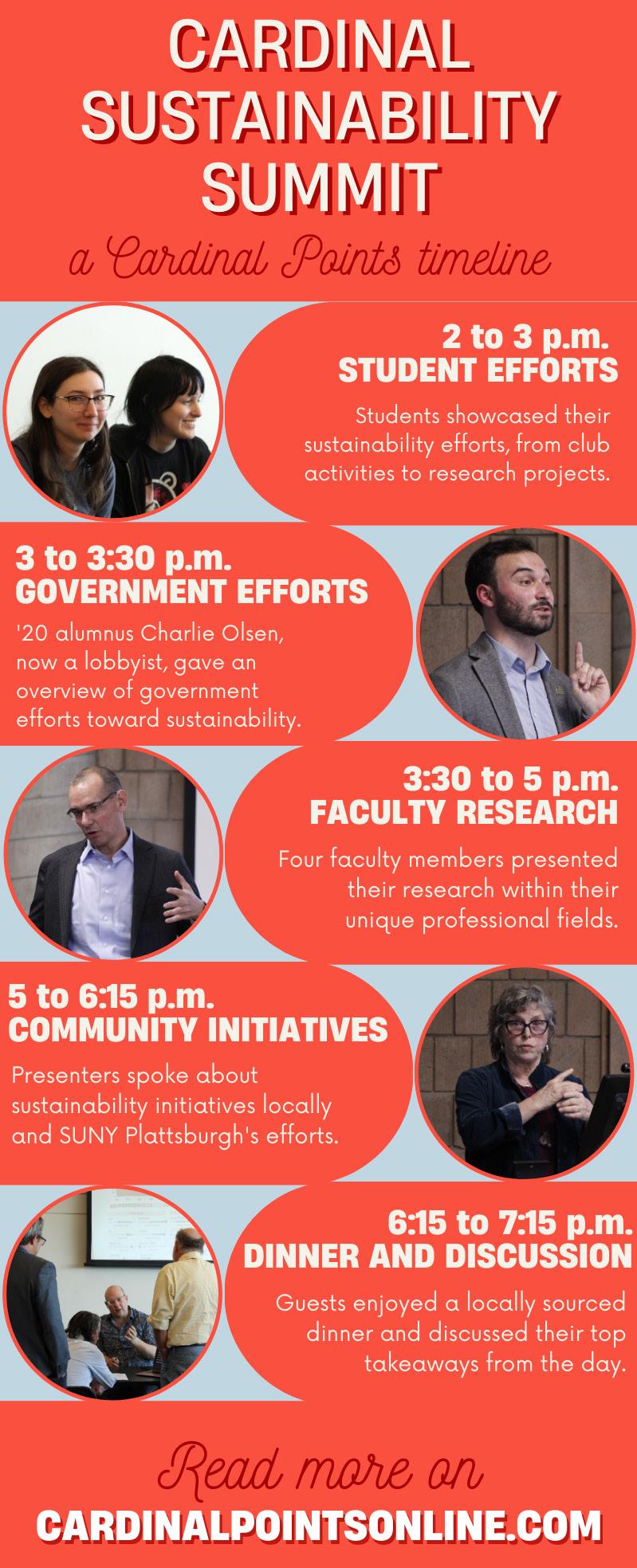
9 minute read
CAREER
from Issue 10
Continued from page 1
Burghy’s Blurbs
Advertisement
Cardinal Cash Update
Six off-campus vendors are still unable to accept Cardinal Cash, according to a post on College Auxiliary Services' Instagram Wednesday, April 26. They are three Stewarts locations, Kinney Drugs, The Butcher Block and the Subway at Walmart. The issue began Feb. 16.
CP Corrections
There are no errors to report this week.
If you see an error in Cardinal Points, email cp@cardinalpointsonline.com
GOT A NEWS TIP?
Contact the news editor at cp@cardinalpointsonline.com.
“She was kind of thrown into this role without a lot of heads-up and she’s handled it like a champ,” Lafountain said. “She hit the ground running and there was no faltering. Everything’s been smooth sailing and we’ve worked really well together as a team.”
Lafountain describes Jackson as “wise and kind,” and admires her “ability to juggle multiple things at the same time.”
Jackson declined to answer questions about herself, which Matthews said shows how “selfless” she is.
Carpentier, too, is a name synonymous with unconditional support. She doesn’t think in monetary terms. She said that if she won the lottery, she wouldn’t buy herself houses or yachts.
“My fantasy is that I would pay everybody’s tuition at Plattsburgh State for a year,” Carpentier said. “So if I ever do win the lottery, there will be a lot of happy kids.”
Carpentier has a gentle nature — Matthews called her everyone’s “lovable Aunt Michele” — and a genuine interest in the lives the students are able to build for themselves thanks to her support.
“I know probably other people think this is weird, but I love seeing who’s having babies and who’s getting married and what they’re doing, and understanding that they’re constructing a whole new set of lives, and I like to see where their kids go to college,” Carpentier said. “It’s knowing that you had some small piece in that is what’s really exciting.” backgrounds presented by HOD, the campus’ only modeling club.
Jackson said Carpentier gets “curious about information” and pursues answers, recalling an instance when Michele noticed a student had not yet graduated despite having 140 completed credits. When Carpentier uncovers such inconsistencies, she’ll get on the phone and “hunt these people down” to offer solutions to help them graduate. Such work isn’t a part of her job.
Black Onyx: the Black Student Union, represented the club in a request for $500 additional allocations. Additional funding would help cover the cost of hosting the club’s barbecue event today, April 28. The event would be an opportunity for the club to celebrate students and college culture as the semester winds down. Briggs said the club is prepared to cut costs where necessary. Senator Muscaan Patel asked whether the event could be rescheduled for the fall semester due to a lower budget, but the event is an annual tradition of Black Onyx. The request for funding was granted unanimously.

This event would also feature work from the club’s previously planned — but canceled due to a low budget — art gallery event. The request for funding was granted with one vote against.
The Student Association also passed a bill and a resolution. This comes as the latest move in recognizing and honoring retiring college staff members. Both were granted unanimously.

Finally, the Senate closed the meetings with the usual announcements.
A representative from the club House of Divinity was in attendance as well, requesting $1,715 for its upcoming fashion show Saturday, May 6. The fashion show would showcase students from all
Senators William Donlon, Munashe Chikukwa, Arshita Pandey, Dhruv Shah and Djeneba Sy all announced their attendance of the Holi event held April 16, which they praised. Additionally, Senator Celine Nwakeze announced an upcoming boba tea event April 30 in Hood Hall. Senator Sumeet Vishwakarma announced he had attended the National Association of Black Accountants' Shark Tank event the day before, as well as been elected Vice President of the 61st Legislation of the Student Association.
“I don’t know who’s going to pick up that kind of work,” Jackson said. “Those things matter a lot to Michele, so she just did them. They’re not in her job description — she just does them.”
No one person can replace Carpentier, and her position will be split in two. Shatawndra Lister, current director of SSS, will take over Carpentier’s duty of overseeing all special programs, such as the Educational Opportunity Program, the Cardinal Achievement Program, Upward Bound and the Accessibility Resources Office. Someone new will be hired to act as a case worker overseeing the Cardinal Cupboard — the campus food shelf — and emergency grants.
Even still, some of what Carpentier does now will slip through the cracks.
“There’s a lot of stuff Michele does that I don’t think you can really hire someone to do — she’s just taken things on during the years because she’s who she is,” Jackson said.
Lister said her team, which will expand from five to 20 people with her promotion, will work to tend to student needs as they identify them. She said support like Carpentier’s is crucial to students' success. Carpentier wants to see students graduate, which becomes a strong motivation for those struggling.

“I can’t say that I’ve ever met anyone else like Michele. Her level of care for her job is out of this world. She is a genuine, kind, would-give-youthe-shirt-off-her-back kind of person,” Lafoun- tain said. “She’s also a comical spitfire.”
Lafountain and Carpentier pay each other visits in their offices across from each other. Sometimes, they call while facing each other through their office windows.
Lister said Carpentier is a great storyteller, and she “really does know everything.” Indeed, there are parts of SUNY Plattsburgh’s history that few besides Michele might know.
Carpentier was literally born on the SUNY Plattsburgh campus. Champlain Valley Hall was part of Champlain Valley Hospital from 1910 to 1972, until the hospital completed its move to its new building on Beekman Street, where it currently stands as Champlain Valley Physicians Hospital. Carpentier says the hospital’s maternity ward, where she was born, used to be where there is now a parking lot.
Carpentier said she’s probably been at SUNY Plattsburgh longer than anyone else has, having begun her career in 1987 as a graduate assistant. She has delayed her retirement twice — once in 2018, after EOP Director Kyla Relaford’s untimely death, and again when Bryan Hartman retired in July 2020. This year, her decision is final.
“I must admit I have mixed feelings, but it’s the right thing to do,” Carpentier said. “Because I’m also a firm believer that you have to bring in young blood to keep things fresh, and it’s time. It’s time for me to retire.”
Carpentier said she’s “not into all that froufrou,” but she begrudg- ingly agreed to a celebration in honor of her retirement. However, her condition was that the proceeds from the $25 tickets go toward scholarships. The reception and dinner will be held May 12 at the Warren Ballrooms in Angell College Center.
Although Jackson will stay until August, with hopes of working alongside the new vice president of ESS who’s expected to step in in July, she has already started to clear out her office shelves. It’s “weird,” she said.
Jackson is trying to “provide lots of folders on Google Drive” with some guidelines for taking up her work.
In an interview last year, Matthews said he, Jackson and Carpentier planned to retire together.
Now, he is postponing his retirement, and he said he wouldn’t be drawn to stay longer if it weren’t for the “right reasons.”
“We’re a small enough institution where you get to know people and get to do lots of really nice things, and a big enough institution where you still have opportunities,” Matthews said. “So we were able to work, get to know people, show what we can do and move into different positions as our careers evolved, as our skill sets evolved. And neither one of us has found a reason to leave. It’s a place we both care deeply about — not just the place, but our students, the alumni, the people that work here. I mean, it’s become our family, in many ways.”
Continued
The project aims to reduce food waste at Clinton Dining Hall, which the group suspects is due to its all-you-care-to-eat setup, by using smaller plates that would make it harder to load it up with excess food.
The next phase of the project will be measuring the food waste produced from larger and smaller plates to see how effective swapping the plates would be. Thatcher is a senior majoring in environmental studies. Although he might not see this project to the end, he said he hopes the next batch of students continue the work.
Thatcher also represented Late Night for the Planet. He said the show is so popular that there are sometimes more people attending than there are chairs to sit on. While usually held at Olive Ridley’s downtown, Late Night for the Planet was recently hosted at Paul Smith’s College in Paul Smiths, New York.
Lucas Kemmerling, a first-semester graduate student, presented his research that examined the quality of a habitat — and the success of its restoration — by comparing the number of birds it could feed to how many birds actually live in the habitat.
Bored by engineering work in a cubicle, Kemmerling took up odd jobs and found himself working in wildlife conservation and restoration. Intrigued by the science behind such work, he decided to pursue a master’s in ecology and natural resources at SUNY Plattsburgh.
Anne Randall, a nonmatriculated graduate student, joined Associate Professor of Environmental Science Mary Alldred’s research project for an opportunity to get handson lab work related to her prior experience with forestry data analysis. The project examined how much phosphorus is in the leaves of the decorative Norway maple, not native to Plattsburgh.
Randall and Alldred’s research project found that a single Norway maple tree’s leaves can produce 8 kilograms — about 17.6 pounds — of phosphorus. While phosphorus is a nutrient that helps tissues and cells grow and rebuild, it also promotes the growth of algae. In large amounts, blooming algae can kill aquatic plants and animals.
Randall said the group might present the research to the City of Plattsburgh or across the lake in Burlington, Vermont with the suggestion of replacing the Norway maple with alternative decorative tree species or improving waste management so the leaves can be removed before the phosphorus leaches into the water.
Also showcasing student efforts was John McMahon, assistant professor of political science.
Last semester, McMahon taught an honors seminar called Environmental Ethics. As part of the course, students were to undertake a creative project demonstrating what they learned. Some of the projects McMahon displayed included his students’ artwork, memes and a short film with an environmentally conscious spin on the classic 2000 horror film “American Psycho.”
In the Alumni Conference Room, ‘20 alumnus Charlie Olsen presented a broad overview of environmental policies and debates surrounding them in Washington, D.C. Olsen is now a lobbyist, working for the National Parks Conservation Association as a climate policy manager. After Olsen’s presentation, some faculty presented their research. Associate Professor of Economics and Finance Dhimitri Qirjo examined what effect the Comprehensive Economic and Trade Agreement between Canada and the European Union had on the 28 participating countries’ greenhouse gas emissions relating to import and export. Assistant Professor of Business Analytics Sabah Bushaj surveyed forests for trees infected with the emerald ash borer to determine the best course of action to save the most trees from the insect. Associate Professor of Geography and Environmental Studies Liou Xie researched Plattsburgh’s housing market, identifying what impedes access to safe and affordable housing. Lastly, Associate Professor of Strategic Management Jeffrey Gauthier examined what techniques bottled water companies use to communicate the social, economic and environmental concerns of sustainability.

Additionally, Assistant Vice President of Facilities Operations Tyson Moulton, joined by energy engineer Jaimee Wilson on Zoom, presented on how SUNY Plattsburgh can move forward in compliance with New York state legislation and SUNY directives to build and remodel campus buildings to be carbon-neutral.
After the presentations, guests could enjoy a dinner of soup, potato salad and sandwiches, all sourced locally from Prays Farmers’ Market in West Plattsburgh. Usually, the college requires that all catering for events be done by its partner company Chartwells, but the planners managed to get an exception.
The summit has been in the works for months, with the idea originating in the fall semester.
To organizers, this summit stands out because it gathered people from various levels and fields of study and work with the common goal of sustainability — a topic gaining more and more traction in academic settings.
Conversations about sustainability have been appearing so frequently in McMahon’s courses that he will be teaching a new permanent course starting next semester — Environmental Political Thought.

“I think this has happened in part because of my own teaching pursuits and because of directions in my subfield of political science, and in part because of student interest,” McMahon wrote in an email exchange following the summit. “And of course each new report on our unfolding climate crisis only amplifies the need for such discussions.”
In facilitating conversations on sustainability within the classroom, McMahon said it is “absolutely crucial” to have a mixture of students with environmentally focused majors and majors in other fields.
“Responding to and taking responsibility for the climate crisis requires a comprehensive — and hopefully justice-oriented — effort, and it’s vital for people in all parts of the college to think carefully and seriously about it,” McMahon wrote in his email.










